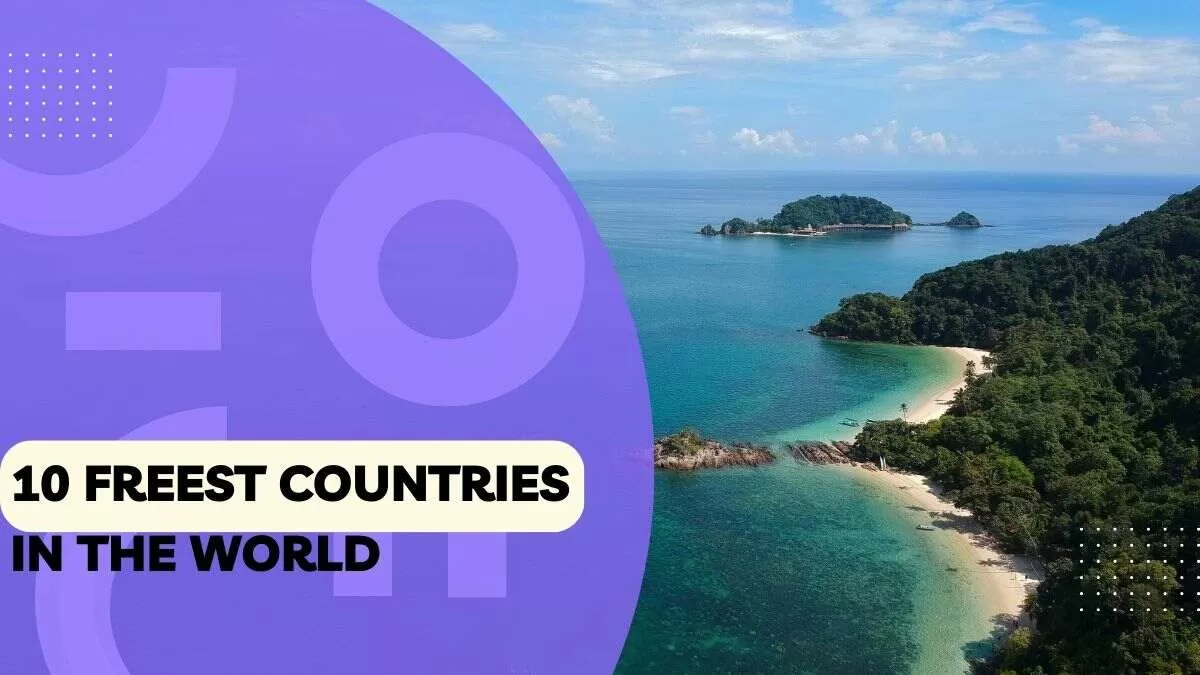
Freedom shapes civilizations, propelling human progress, and captivating us as travellers and global citizens. Nonetheless, freedom remains far from an abstract ideal; instead, it thrives within the laws, cultures, and communities of the most liberated nations on Earth
9 Freest Countries In The World
Annually, the Human Freedom Index proffers invaluable insights into this query. Drawing upon the most recent iteration of this Index, we shall take a look at the 9 freest countries globally, delving into the political bedrock underpinning their exceptional status.
The freest countries in the world are:
1. Switzerland
2. New Zealand
3. Estonia
4. Denmark
5. Ireland
6. Sweden
7. Iceland
8. Finland
9. The Netherlands
Freest Countries In The World
1. Switzerland
At the forefront of global freedom stands Switzerland, a haven of liberty in Europe. Nestled amid the majestic Alps and serene lakes, this diminutive nation champions freedom like no other. Switzerland’s unique political landscape is a marvel, founded on direct democracy and federalism. This model grants Swiss cantons substantial powers, empowering local governance to address citizens’ daily concerns. Thus, political participation becomes ingrained in Swiss life, not a remote concept but a vital part. The cornerstone of Swiss politics is direct democracy, giving citizens a voice in frequent votes on diverse issues, and fostering engagement and ownership.
Switzerland extends freedom into its culture, with high societal trust, security, and respect for autonomy. Exceptional standards of living shine through in education, healthcare, and urban planning. Language diversity, including German, French, Italian, and Romansh, reflects cultural inclusivity, enabling Swiss citizens to connect globally.
2. New Zealand
New Zealand, ranking second on the Human Freedom Index, embodies freedom in its political ethos, societal norms, and cultural values. Its mixed-member proportional representation system ensures equitable political representation, fostering a vibrant democracy. Transparency prevails, with high-ranking officials publicly disclosing expenses, enhancing trust between government and citizens.
New Zealand’s commitment to freedom extends to society, exemplified by early women’s suffrage and ongoing gender equality efforts. Freedom here is not just symbolic but ingrained in daily practices, empowering communities and prioritizing environmental conservation. The Treaty of Waitangi underpins an inclusive societal ethos, recognizing Maori rights.
3. Estonia
Estonia, a European digital paradise, claims the third spot in global freedom. Its e-governance revolutionizes public services, including the pioneering e-residency program, allowing global citizens to establish businesses in Estonia.
Estonia’s digital identity system enables online voting, access to public services, and secure document signing, streamlining government procedures and democratizing access.
The commitment to freedom echoes in society, with equality, quality education, and healthcare for all. Freedom of speech thrives, fostering open dialogue and critical thinking in education. Estonia exemplifies a fusion of political and personal freedom.
4. Denmark
Denmark, in the fourth position, intertwines political and cultural freedom. A constitutional monarchy and parliamentary system uphold democratic values, characterized by accessible politicians who cycle to work. Denmark’s reputation for low corruption underscores its transparency and rule of law, fortifying political freedom.
Freedom of expression is cherished, demonstrated even in royal humour. Denmark’s societal fabric respects equality through the unwritten ‘jante-loven’ law, discouraging arrogance.
5. Ireland
Ireland’s commitment to freedom ranked fifth globally, emanates from its parliamentary democracy and a written constitution that safeguards human rights. Irish politics thrives on engagement, advocating justice and fairness. The nation’s peaceful processes, like the Good Friday Agreement, showcase its dedication to freedom and peace.
Ireland’s cultural expression has historically championed freedom and identity. Enshrining housing rights in the constitution emphasizes its commitment to fundamental human needs. The resurgence of Irish Gaelic reflects a rekindled connection to cultural diversity and freedom.
6. Sweden
Sweden, in sixth place, weaves political rights, social welfare, gender equality, and individual freedom into a holistic concept of freedom. A democratic constitution ensures civil liberties, bolstered by transparency and low corruption levels. Sweden’s social welfare guarantees high living standards and equal access to public services.
Generous parental leave and family support epitomize personal freedom. The right to roam freely in nature reinforces environmental consciousness and communal respect.
7. Iceland
Iceland stands out for equality and welfare, with strong social security, accessible healthcare, and exceptional education. Gender equality, safety, and a democratic constitution support political freedom. Civic participation is robust, with active engagement and peaceful approaches.
Iceland maintains peace through diplomacy and mutual respect, not military might, ranking among the world’s safest nations.
8. Finland
Finland, in eighth place, emphasizes education, healthcare, and happiness as fundamental rights. Citizens actively engage in politics, proposing legislation directly. Transparency and low corruption strengthen political freedom.
The education system, offering free meals and transportation, promotes equal opportunities. Unique policies like the universal basic income experiment highlight economic freedom. ‘Everyman’s right’ to roam freely in nature showcases environmental consciousness and leisure freedom.
9. The Netherlands
The Netherlands, ninth in freedom, upholds human rights and the rule of law through its democratic constitution. Political pluralism ensures diverse voices are heard, fostering representative and direct democracy. The Netherlands champions LGBTQ+ rights and anti-discrimination laws, reflecting personal freedom and equality.
Cultural freedom thrives, encouraging expression and innovation in art, while liberal attitudes towards issues like drug use and sex work embody a unique societal ethos.
